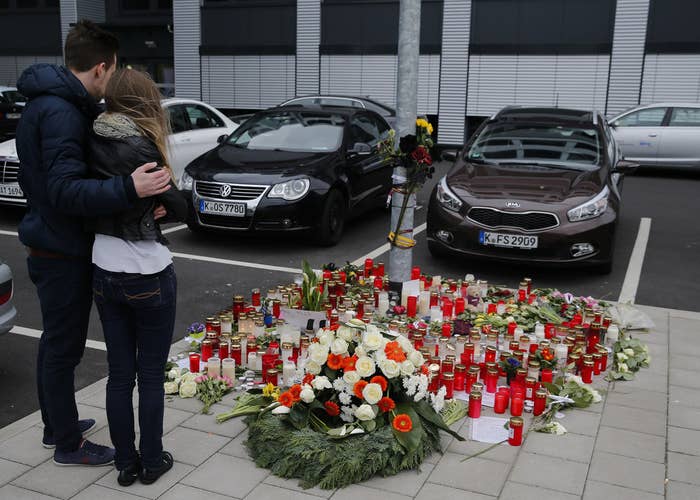
It's very difficult to screen airplane pilots for mental health issues that may drive them to do harm to themselves or their passengers while in the air, aviation experts told BuzzFeed News.
On Thursday, a French prosecutor said Andreas Lubitz, the co-pilot of Germanwings Flight 9525, had locked the captain out of the aircraft and made its descent into the Alps "voluntarily" — killing 149 other people along with himself.
Officials originally said Lubitz was 28 years old. Reports from other news organizations, including the New York Times, cited his birthday as Dec. 18, 1987, which would make him 27.
The reason for the forced descent, though, has not been explained conclusively. Officials have widely ruled out terrorism and the prosecutor refused to call it suicide.
Generally, though, while pilot murder-suicide is incredibly rare, it is also near impossible to prevent, the experts said.
"Pilots are human beings and no profession is going to be totally bulletproof against every human weakness," Patrick Smith, an aviation expert, pilot, and the author of Cockpit Confidential, told BuzzFeed News.
"All the testing … in the world isn't going to preclude [this]," Smith said.
Data shows that pilots barely ever commit suicide by crashing their own plane, and even less frequently do so while innocent passengers are on board.
In 2014, the Federal Aviation Administration released a study that examined aircraft-assisted pilot suicides in the U.S. from 2003–2012.
The study found that, in that time frame, there were eight instances of pilots using their plane to kill themselves, down from 16 in the previous decade. All the pilots in the instances were male and some were on drugs, alcohol, or antidepressants.
Only one of the pilots did so with another person on board. In that instance, a 47-year-old student pilot drove his plane into his ex–mother-in-law's house while flying with his child in an act of murder-suicide.
Despite the rarity of pilot suicide, the study noted that it is difficult to predict if a pilot would commit such an act. All of the pilots in the study were medically screened, and none of them showed signs of depression or suicidal thoughts. The study also said that pilots in training are also not likely to volunteer that type of information out of fear they will not be cleared for a license.
The study also said that most pilots have a unique relationship with their aircraft that may cause them to use it as a means to kill themselves.
"During times of excessive stress, pilots predisposed to self-destructive behaviors may display these behaviors during flight," it said.
Lubitz took a leave of absence from his training for several months, Carsten Spohr, the CEO of Lufthansa, said Thursday. He added he could not provide further details on the nature of his hiatus.
"We cannot tell you the reason of this interruption," he said, but added that it was "not unusual" for trainees to do so. "As he returned to training, he passed all tests with 100%," Spohr said.
Uta Dressel, a press officer at Lufthansa Flight Training, said, "In general, I can say that as soon as there are leads on problems during the education, we react with support from psychologists. These problems can be of different nature. We react, when the student himself says, he doesn't feel fit or names other kinds of problems.
"If those students work as flight attendants, take a pause, or do something else in the meantime is being decided from case to case."
Spohr said Lubitz went through a psychological screening as part of the training. Captain Mike Vivian, a former head of flight operations at the UK Civil Aviation Authority, told the BBC that candidates are generally asked about their family relationships, whether they suffered depression, or had suicidal feelings.
Spohr said the airline relies on this sort of internal reporting to flag potential problem cases, but that it had clearly failed.
"We have at Lufthansa a reporting system where crew can report without being punished their own problems or they can report about problems of others without any kind of punishment," he told CNN. "That hasn't been used either in this case, so all these safety nets we are so proud of here have not worked in this case."
Glenn Winn, who works at the University of Southern California's Aviation Security program, told BuzzFeed News that the chances of a pilot intentionally crashing a plane are "1 in 10 million," but that people do slip through the cracks.
"We're human," he said, adding, "it can happen in any discipline on Earth."
Winn and Smith agreed that there is little airlines could do that they are not already doing to ensure pilots are not suffering from mental health or exhaustion issues that may cause them to snap.
Winn said that pilots who are suffering actually have a better chance of being flagged by their own co-workers than in other professions because of the amount of time they spend with each other in isolation.
"You're going to find out real quick if somebody is not reacting properly in the cockpit," he said.
Smith said that mental health evaluation is part of a standard screening for commercial pilots. He said he was not sure if making the mental health screening process more stringent made sense, because these incidents are so incredibly rare.
"Where is the precedence?" he asked, adding that there are more examples of doctors and police officers killing people than pilots doing so.
The experts also agreed that it was unlikely that Lubitz snapped from being overworked or exhausted. Germanwings is a budget airline, and pilots at similar outfits have said that they are sometimes overworked and fatigued.
Smith said there was no denying that "the job can be stressful," but that there was no evidence that a budget-airline pilot's schedule would cause such an act.
Winn agreed, noting that Lubitz didn't seem to be on a stressful schedule on the day of the crash — the total flight time for the flight was only about two hours.
Still, the experts said that incidents such as the Germanwings crash should not freak people out about flying.
"I totally understand why this story is so compelling and why it frightens people," Smith said, "but I can't overstate how uncommon this thing is."
